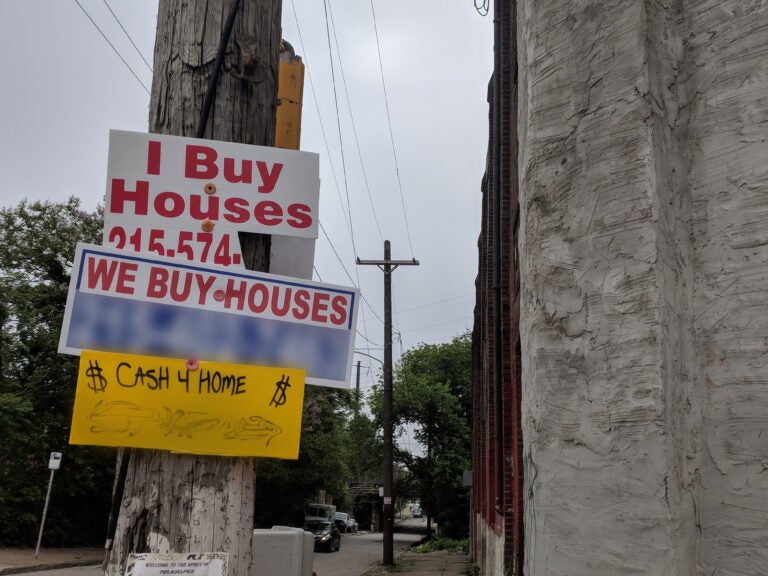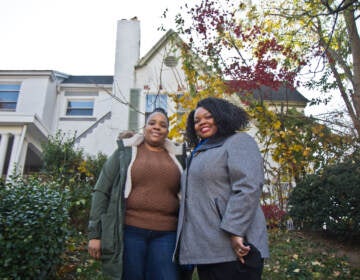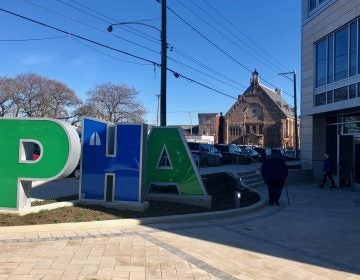New Philly law cracks down on blockbusting ‘We Buy Houses’ solicitations
Steep penalties against unscrupulous investors aim to protect homeowners from being pressured into below-market sales.

Signs from residential wholesale buyers can be found all over Philadelphia, advertising fast cash for homes. (Courtesy of Community Legal Services)
In 1963, Philadelphia enacted the Fair Practices Ordinance (FPO), a civil rights law that included protections against racially exploitative “blockbusting.” This week, the city announced an expansion of the FPO to address a new version of this unscrupulous housing practice: cracking down on “We Buy Houses” and similar intimidation practices.
The practice of blockbusting was born in the years after World War II as Black families sought to buy homes in northern cities like Philadelphia. Real estate agents pressured white homeowners to hastily sell their properties, tapping into racist attitudes to convince those homeowners that changing demographics would drive down property values. “You don’t want to be the last white family on your block,” real estate agents would warn.
In a panic, white homeowners would sell their homes for cheap. Agents would then turn around and sell to Black homeowners (who were limited in where they could live due to discriminatory practices like redlining) at inflated prices.
Philadelphia responded to blockbusting practices by adopting the FPO, which made it unlawful for real estate agents to solicit a homeowner after the homeowner had expressed they were not interested in selling. But the FPO only covered real estate agents, and it had other limitations.
Today, unscrupulous real estate investors have adopted similarly deceptive tactics in gentrifying Philadelphia neighborhoods. This time, residential property wholesalers — the so-called “We Buy Houses” scammers — have flipped the script.
They trick longtime Black homeowners in rapidly gentrifying neighborhoods into signing papers to sell their homes for far less than market value. These homeowners, typically older adults, may not know the true value of their home or face unbearable pressure from in-home salespeople. With the stroke of a pen, they can lose their home.
Efforts from residential property wholesalers also undermine important policies put in place by the city to help homeowners stay in their homes and neighborhoods. Wholesalers don’t tell homeowners about the city’s property tax relief programs, repair programs, or housing counselors and legal services available to homeowners in foreclosure, and their pitches for a quick and easy cash sale exacerbate a wave of Black homeowners being forced out of cities due to poverty, job loss, and foreclosure. These families not only lose their homes but also whatever equity they have managed to build up over the years.
In December 2020, Philadelphia passed landmark legislation expanding the FPO to address this abusive practice. Residential property wholesalers are now required to register and provide their real names and addresses to the city. They must follow a code of ethics. And homeowners must be given a Homeowners Bill of Rights at least three days before signing a sales contract.
This week, the city launched another piece of the law: a universal Do Not Solicit list.
Homeowners can now easily register their names on a list if they do not want to receive letters, postcards, phone calls, text messages, door hangers, or any other solicitation seeking to buy their home. Families and neighbors can help older homeowners join the list to reduce the risk that their loved ones will be pressured into selling their homes. And the penalties for violating the Do Not Solicit list can be steep: up to $2,000 fines per solicitation.
In the last two years, real estate investors have stepped up their efforts to acquire properties as home prices in Philadelphia have skyrocketed by over 20%. If we are to remain a city that values affordable homeownership, it is more important than ever to help longtime homeowners make informed decisions and support them when they express a desire to stay in their homes.
Community Legal Services often recommends that clients looking to sell their homes talk with a licensed real estate agent to ensure they receive a fair price. Of course, if a homeowner wants to sell, by all means, they should be able to cash out. But this new law, expanding on the anti-blockbusting laws of the 1950s, will rein in the worst abuses in this industry.
Homeowners can join the Do Not Solicit list online or call the Do Not Solicit hotline at 215-686-4500 and ask to be added to the list.
___
Kate Dugan and Michael Froehlich are attorneys in the Homeownership and Consumer Rights Unit at Community Legal Services of Philadelphia.
The Homeownership and Consumer Rights Unit represents homeowners facing mortgage and tax foreclosures, and pursues economic justice on behalf of clients facing fraudulent consumer practices, abusive debt collection, and a variety of consumer scams affecting low-income families.

Subscribe to PlanPhilly
WHYY is your source for fact-based, in-depth journalism and information. As a nonprofit organization, we rely on financial support from readers like you. Please give today.









